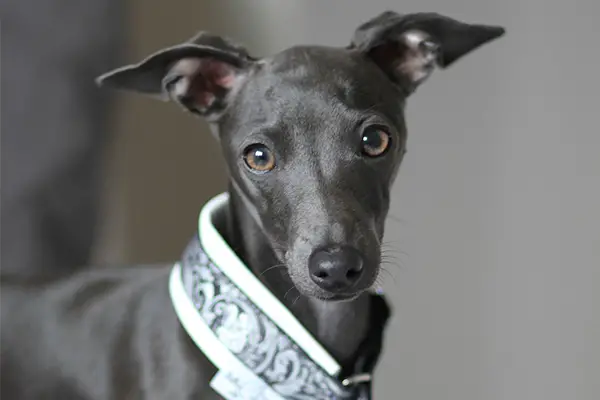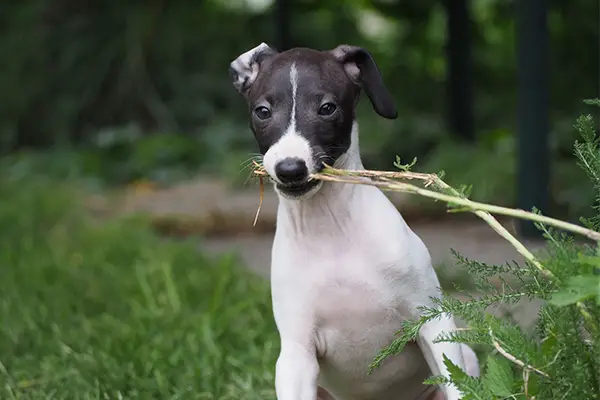Italian Greyhounds are miniature versions of Greyhounds but are more slender. The Italian Greyhound was considered a companion for noblewomen in the Middle Ages. Despite their size, the Italian Greyhounds are built with a muscular and athletic body. They are covered with a short, smooth coat that comes in the colors of blues and grays.
Even though they are as small as toy dogs, they are not to be considered lap dogs. Italian Greyhounds are highly energetic breeds, and they will run when opportunity strikes. They demand attention, and they are not the easiest dogs to handle.
If you have the patience and you’re up to the challenge, these dogs are the fun, loving companions. Shower them with their needed love and care, and they’ll surely be a loveable addition to your household.

Italian Greyhound Statistics
| Dog Breed Group | Toy |
| Breed Size | Small |
| Height | 13-15 inches |
| Weight | 7-14 pounds |
| Lifespan | 14-15 years |
Italian Greyhound Ratings
| Energy level | |
| Exercise needs | |
| Requires attention | |
| Playfulness | |
| Trainability | |
| Shedding | |
| Grooming | |
| Friendly with family | |
| Friendly with kids | |
| Friendly with strangers | |
| Friendly with other dogs | |
| Prey Drive |
Italian Greyhound History
Italian Greyhounds are believed to have originated in the Mediterranean countries over 2000 years ago. Yes, these dogs are ancient, and there are archaeological recoveries that serve as proof. No one knows what served as the original purpose of these dogs, but people have known them to be hunters and companions.
It wasn’t until Renaissance Italy that these dogs became status symbols of the rich and nobles. You can often see paintings from Renaissance masters that show how Italian Greyhounds scream aristocracy. When the 1600s came, the Italian greyhound reached England, and royals immediately loved the breed.
Among the wealthiest who owned these dogs are James I, Frederick the Great, Catherine the Great, Anne of Denmark, and our favorite dog lover, Queen Victoria. Even an African king named Lobengula swapped 200 cattle just for a single Italian Greyhound. That’s how popular the dogs were.
By 1886, the American Kennel Club officially registered the dog breed, where their popularity continued to rise. Sadly, when the two World Wars broke out, breeding became unaffordable, and the number of Italian Greyhounds slowly decreased.
Their number was slowly restored, and now, the breed ranks 73rd as the most popular dog breed in the US. They remain to be an excellent family pet that gives delight to their humans.

Italian Greyhound Temperament
Italian Greyhounds are sweet-natured and gentle dogs. They love comfort, and they are affectionate and loving to their family.
These dogs are usually one-person or one-family dogs. They can become shy towards strangers, amiable with other animals, and good with children. They love attention, and if they’re given less of it, they can grow to be shy or destructive.
Known to be adaptable in any living situation, the Italian greyhound will happily snuggle by your side or hide under a soft blanket or pillow. However, he is not a couch potato. This dog is extremely playful and highly energetic. You can expect sudden outbursts of energy once he is outdoors.
Italian Greyhounds are not the best dogs for inexperienced dog owners. They can be too much to handle, especially with their demanding personality.
Early socialization and training are highly encouraged for these dogs. This will help make them more well-rounded and get them accustomed to new things, people, and animals. If you find it hard to train them on your own, enroll them in a puppy school.
It will also help if you meet one of his parents so you know what temperaments you can expect from your dog.
Italian Greyhound Care Requirements
- Nutrition: Italian Greyhounds don’t necessarily have special feeding requirements. All you need to remember is to feed them a high-quality and well-balanced meal. It should contain all the essential nutrients such as protein, carbohydrates, fats, vitamins, and minerals. It’s essential only to buy high-quality ingredients. Great sources of protein will always be animal meat. You can add some fruits and vegetables for sources of fiber and vitamins, whole grains for carbohydrates, and fish or chicken oils for fats. Check your dog for any allergies and make sure to stay away from those ingredients. If you’re feeding them dog food, only choose the premium ones that don’t contain any fillers and harmful additives.
- Grooming: The Italian Greyhound’s short coats shed seasonally. They may not need a lot of brushing, but it is highly recommended to do it at least once a week. This will help clean out their coat from any debris or dirt and remove dead hair. During the shedding season, it’s advisable to do it daily. You also don’t need to give frequent baths to an Italian Greyhound. Once every few months will do unless he gets too dirty from his daily activities. His ears, however, should be cleaned up regularly to prevent ear infection. Pay attention to his nails too. These should be kept short always to avoid discomfort and pain from your dog.
- Exercise: Italian Greyhounds are active dog breeds that require regular exercise. Activities to be given don’t need to be strenuous; usually, playtime or daily walks should suffice. Make sure to keep him on-leash if you’re taking him out for a walk. If you’re going to let him run, keep him inside a secured fence. These are fast running dogs, and it might be hard to catch them once you let them loose.
- Health: Although Italian Greyhounds are generally healthy dogs with a long lifespan, they are prone to several diseases. One of the most common ones is eye disease such as cataracts, progressive retinal atrophy, and vitreous degeneration. Health conditions that affect bones and joints such as hip dysplasia, Legg-calve-Perthes disease, and patellar luxation, are also common. Some rare diseases are von Willebrand’s disease, hypothyroidism, allergies, epilepsy, and cryptorchidism. If possible, have your dog take some screening tests for certain diseases so you can rule them out. Always observe your dog’s behavior, too, and monitor any changes. I also recommend meeting at least one of your puppy’s parents so you can be aware of existing genetic health conditions and ensure that your dog is prevented from it.
- Lifespan: The life expectancy of Italian Greyhounds is 14-15 years.
Famous Italian Greyhounds
- Nelly: The Italian Greyhound from the film “Good Boy!”
- Kermit: The Italian Greyhound of Jenna Marbles
- Billy and Minnie: Two Italian Greyhounds depicted in a Stonehenge’s piece of art

Fun Facts about Italian Greyhounds
- Italian Greyhounds are one of the oldest dog breeds existing between 4000 to 7000 years ago.
- They did not originally come from Italy; they are believed to have first been developed in Ancient Egypt.
- They are sometimes called Iggy.
- They are the smallest members of the sighthound family.
- They were status symbols of nobility and royalty.
- They are known to be the second-best substitute for a second child.
Check Out Other Toy Dog Breeds:
Affenpinscher, Brussels Griffon, Cavalier King Charles Spaniel, Chihuahua, Chinese Crested, English Toy Spaniel, Havanese, Japanese Chin, Maltese, Miniature Pinscher, Papillon, Pekingese, Pomeranian, Pug, Shih Tzu, Silky Terrier, Toy Fox Terrier, Yorkshire Terrier
